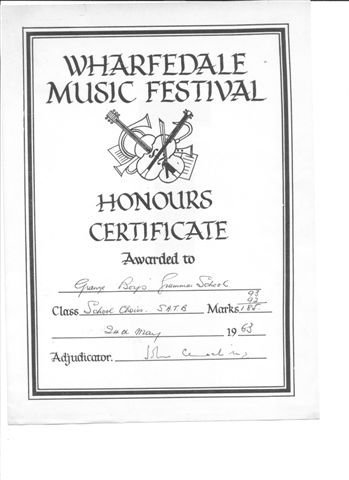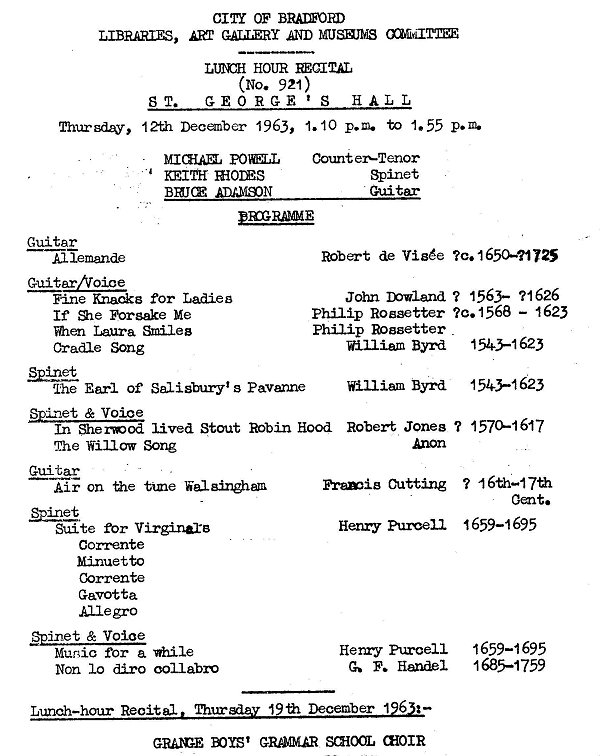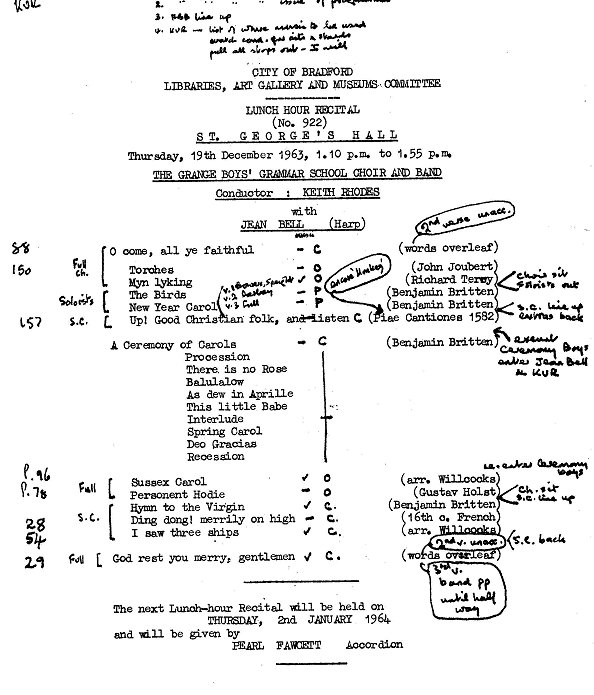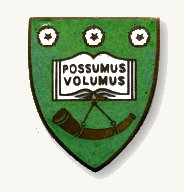Music 1963
1963 School Magazine Report
Bark and them lot
No, this is not a report on the year’s botanical activities. The above heading is a phrase heard as commonly as any in the music room in this, or any other year, to denote composers. Bark (as the unfortunate JSB is so often mis-spelt) is the generic name for composers of any period in music, probably because Beethoven is more difficult to pronounce and spell. Somewhat more surprising is the fact that the boys of Grange should to remember Bach so readily, for in the course of a year they may hear three works by Bach as against a score or more by the Tschaikovsky group. There is, perhaps, a deeper reason than spelling. Bach has been dead a long time, and in a boy’s mind he represents a whole dead world of “square” music; the only “composer” living now is Lionel Bart, and his music is, if not exactly square, elliptical.
Of all the school’s curricula music seems to meet with the stiffest opposition from the boys. In his first year a boy will listen with rapt attention to anything from “Tubby the Tuba” to the primitive excitement of the “Rite of Spring”; in his second year he seems to have a change of heart; in his third year he is definitely hostile towards any “school” music. He is now thirteen, the age when he becomes a loyal subject of the Kingdom of Transistoria. For seventy or more hours a week he lives in a mid-Atlantic world where Mr WM7 tells him that the ubiquitous Beatles are the gods to be worshipped for the next few weeks. So the Beatles share top worshipping billing with City or Park Avenue.
Hero-worship is part of every healthy growing boy’s world. The tragedy, for such it is, of our present methods of mass publicity on an apparently unlimited budget is that the heroes, musically speaking, are becoming less and less talented whilst their music becomes simpler and simpler as it caters for a mass audience of semi-literates. Seventy hours of this smooth-talking is difficult to combat in forty minutes of school time. The strange part about this “combat” is that it is one-sided; the music staff never suggest that a boy should NOT admire the Beatles.Here we have the crux of the matter, and perhaps a partial remedy for this sad state of affairs. Readers of this article who are parents of our boys can help enormously in this. Somehow we have to convince our thirteen, fourteen and fifteen-year-olds that it is perfectly possible to admire the world of pop and still find enjoyment of a different kind from symphonic music. One kind of enjoyment does not automatically cancel another out. After all, we do not refuse our Christmas dinner just because we have fish and chips more often.
Before I pass on to the more pleasant reporting of the year’s activities in music, I cannot but include the sixth form in the above comments. Two years ago in a similar article in the school magazine we complained quite seriously of a lack of cultural interests among our senior boys. The same remarks are sadly true today for, with some notable exceptions, 6A show (that’s our year, chaps!) no more interest in music than 3X. The transistor has them its grip too, and the Music Club is attended only by the keen few. Unfortunately these boys seem unaware of the fact that a flair for badminton or table tennis will not secure for them a university place; a wider range of extra-curricular interests will.
What I have to say now shows what a paradox the musical life of Grange is! During the year the reputation of the school has been upheld by the choir more often than by any other school activity. The choir goes on from strength to strength, one example of which is the fact that at this year’s Wharfedale Festival we were the only competitors, the others having by that token conceded defeat. This, of course, is not a good thing, and unless more choirs enter the competition Grange will no doubt have to seek new pastures of competition.
At our annual lunch-hour concert in November last the choir gave a first performance of the “Brazilian Psalm” along with a selection of songs from Britten’s popular “Friday Afternoons” series sung by a group of high-powered soloists and di Lassus’ “Echo Song”. An amusing sidelight to this occasion was provided by the “Telegraph & Argus” which included a glowing report of the band’s playing of the “Trumpet Voluntary”. Actually the band didn’t play because Michael Holmes, the soloist, was not able to attend. The paper did, however, correctly comment on the large audience, which they said, was the highest of the year.
Over Christmas the choir had the distinction of being invited to provide the entertainment during the Christmas dinners of two masonic lodges on the same evening, the two performances following one another. The rendering of carols well-known and not so well-known pleased the members so much that they generously contributed almost ten pounds to the music department funds.
As soon as the worst of the winter weather was over, the choir activities continued with a visit to St Chad’s Church, Headingley, to take part in a concert given by Her Majesty’s Inspectors for Leeds district. The choir sang the difficult “Rejoice in the Lamb” by Britten, and motets by Palestrina, Byrd and Stanford. This concert had a repeat performance later at Heaton Parish Church.
Later in the spring the Yorkshire Youth Choir and Orchestra performed Britten’s oratorio “St Nicholas” at the St George’s Hall here in Bradford. Soloist were selected from our choir, namely: Darbey, Capstick and Iredale; the three latter represented the “three pickled boys” in the story who, because of a famine in the land, are kidnapped, killed and salted down. We cannot say with any authority how many masters secretly wished this tale to be true!
Mention of young Darbey in 2A reminds me that during the spring he played an important part in the amateur production of “The Music Man” at the Alhambra Theatre. He acted well and his clear treble voice rang through the theatre as clear as a bell to the delight of the large audiences. He has a decided talent, and one wonders how many other boys would show mature confidence when facing 1700 people.
Later in the summer term we had an interesting visitor in Professor Cooper from Florida State University, who was touring England on research into the “English” style of singing and had had the Grange choir recommended to him. He seemed much impressed with us and took away with him a tape recording made some time before his visit.
I think it would be less than fair to conclude these notes which contain so much criticism, without balancing appreciation of the boys who do so much sterling work in the department. Cummings and Darke, two boys in the Upper Sixth, not only give devoted service to the choir and music club, but can be relied upon to play hymns in assembly at a moment’s notice and vie with each other as to who plays the organ most during the speech day ceremony!. This on top of their exacting A level course. Lerman, the deputy head-boy this year, manages to combine a gift for science with a love of music. For three years now he has led the tenors in the choir, giving hours of his time without apparently neglecting his studies. Holdsworth too gives of his best whether as a morning hymn “basher” or as tympanist in the orchestra. These boys, and many others, not only deserve our thanks and praise, but stand as an incentive to younger boys. They will leave Grange with a love of music which will give them pleasure all their lives.

The following copy of the programme for the choir's Lunch Hour Recital at St George's Hall, Bradford on 12th December 1963 was kindly donated by Harry Atkinson

The following copy of the programme for the choir's Lunch Hour Recital at St George's Hall, Bradford on 19th December 1963 was kindly donated by Harry Atkinson

